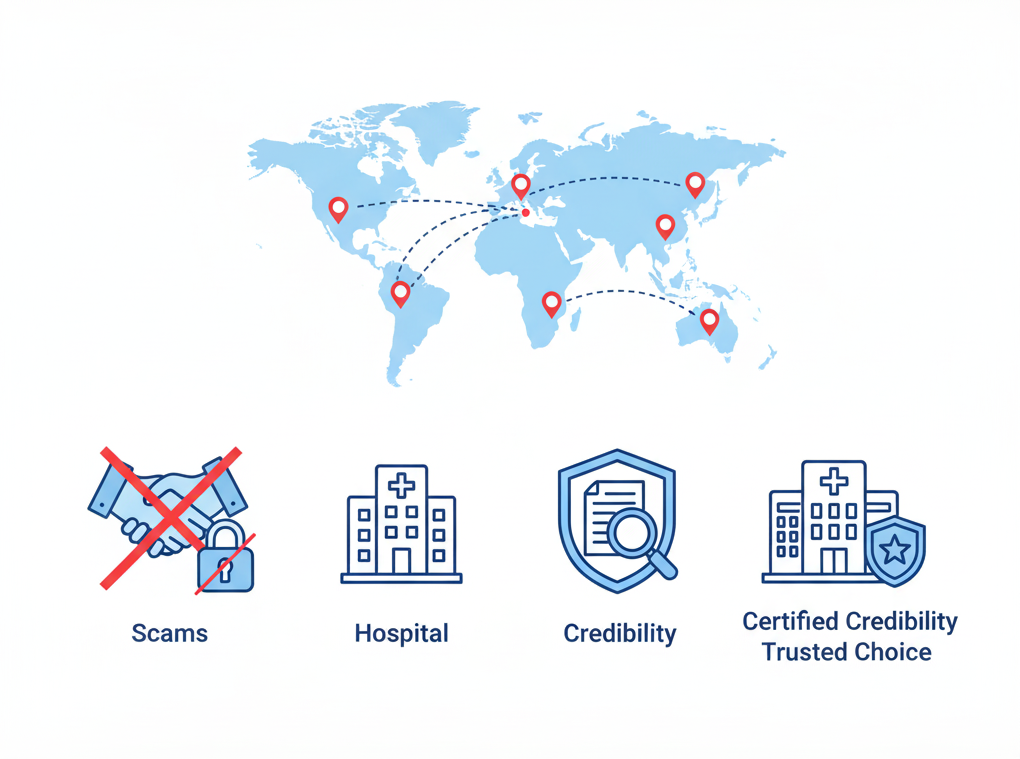
How to Avoid Medical Tourism Scams and Ensure Hospital Credibility
Medical tourism continues to be a rapidly growing industry in 2025, opening doors for affordable and advanced healthcare options worldwide. However, this growth also attracts scams and unscrupulous providers taking advantage of vulnerable patients seeking care abroad. Avoiding these pitfalls and verifying hospital credibility is critical to ensuring a safe, effective, and worry-free medical travel experience.
This exhaustive guide explains common scams, key red flags to watch for, practical verification steps, and reliable resources to empower patients in making well-informed medical tourism decisions.
Understanding the Risks: Common Medical Tourism Scams and Warning Signs
1. Misleading or Fake Hospital Accreditation
A hallmark of trustworthy hospitals is accreditation by recognized bodies like the Joint Commission International (JCI), International Society for Quality in Health Care (ISQua), or country-specific certifications (e.g., NABH in India). Scam clinics might claim fake or misleading accreditation to appear credible.
Tip: Independently verify hospital accreditations on official accreditation body websites. If a hospital cannot provide valid proof or claims accreditation from unknown entities, avoid it.
2. Unlicensed or Unqualified Physicians
Some scams involve using doctors with fake licenses, inadequate training, or unverified qualifications.
Tip: Ask for the full names, registration numbers, qualifications, and specialties of your treating physicians. Cross-check these with national medical council databases or licensing authorities online. Reputable hospitals will openly share these credentials.
3. “Too Good to Be True” Prices and Packages
Offers vastly cheaper packages with unclear components, “free” add-ons, or bundled services that seem exceptionally low often hide hidden costs or substandard care.
Tip: Request an itemized written cost estimate covering every element—surgery fees, hospital stay, anesthesia, medications, consultations, lab tests, and follow-ups. Be suspicious of vague pricing or pressure to pay upfront without transparency.
4. Absence of Personalized Pre-Surgical Assessment
Genuine providers require detailed medical histories, prior test results, and virtual or in-person consultations before recommending and quoting surgeries. Scammers often omit or minimize these to lure quick payments.
Tip: Never commit financially without at least one medical consultation directly with your surgeon. Personalized evaluations reflect professional ethics and quality care.
5. Fake or Overly Positive Patient Reviews
Fraudulent hospitals create bogus online testimonials or incentivize positive reviews to mask poor outcomes.
Tip: Verify reviews across multiple independent platforms such as Healthgrades, RealSelf, Google Reviews, medical tourism forums, and social media groups. Seek consistent, detailed patient narratives—red flags include repetitively short, generic praises without specifics.
6. Pushy Sales Tactics and Limited-Time Offers
High-pressure sales to “book now” or “limited appointments” without sufficient medical discussion are typical signs of scam operations.
Tip: Legitimate hospitals respect patient autonomy and encourage careful decision-making, second opinions, and realistic scheduling.
7. Unverified or Inadequate Facilities
Photos and websites can be misleading; some providers use stock images or outdated clinic information.
Tip: Check the hospital’s current status with regulatory authorities or accreditation bodies. Request patient photos during stays, virtual tours, or videos to assess clinics accurately.
8. Hidden Costs and Poor Aftercare
Watch for exclusion of post-operative care or follow-up consultations in packages, which may leave patients stranded without support.
Tip: Confirm the scope of post-surgery care your package includes. Reliable providers offer integrated care plans including recovery assistance and access to telemedicine consultations abroad.
Practical Steps to Verify Hospital and Doctor Credibility
Step 1: Verify Hospital Accreditation and Certification
Check hospital accreditation on recognized global or national websites such as the JCI portal or ISQua. Confirm that the accreditation is current and applicable for the specific medical department or treatment you require.
Step 2: Authenticate Doctor Credentials and Experience
Confirm physicians’ medical licenses with official national or regional medical councils. Review their training, board certifications, years of experience, and specialties via credible hospital websites or professional medical directories.
Step 3: Consult Independent Patient Reviews and Forums
Read through patient feedback on trusted third-party websites and forums. Engage with online patient communities to gather firsthand experiences and advice. Look for patterns in feedback regarding treatment quality, professionalism, and post-op care.
Step 4: Request Transparent Medical Consultations and Quotes
Book video or in-person consultations with doctors to discuss your condition, treatment options, and anticipated outcomes. Be wary if providers avoid detailed discussions or hesitate sharing full cost breakdowns upfront.
Step 5: Utilize Trusted Medical Tourism Facilitators
Consider using accredited medical tourism agencies or facilitators with strong reputations and verified hospital partnerships. These intermediaries provide additional safeguards through vetted providers, service guarantees, transparent pricing, and patient support.
Step 6: Research Legal and Safety Standards in Destination Country
Investigate the legal protections for patients in the country where the hospital operates. Prefer destinations with robust healthcare regulatory frameworks, malpractice laws, and transparent patient rights.
Additional Tips to Avoid Scams and Ensure a Safe Medical Tourism Experience
-
Use secure payment methods such as credit cards or escrow services offering buyer protection.
-
Keep detailed documentation of all communications, contracts, and medical records.
-
Avoid unsolicited offers via emails or calls promising miracle cures or suspicious discounts.
-
Consult government medical tourism advisories or reliable third-party resources.
-
Beware of aggressive marketing tactics and sales pressure.
-
Insist on full informed consent in a language you understand before any procedure.
-
Prepare a contingency plan including emergency contacts and local embassy details.










